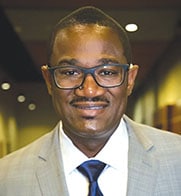HOUSTON—From the inner city to the suburbs, low-income to affluent neighborhoods, about a half dozen pastors and local Baptist association leaders circumnavigated the nation’s most diverse city during the first Reach Houston vision tour, June 5-7.
Reach Houston is an intentional focus of the Southern Baptists of Texas Convention in the areas of church planting and church revitalization. Ben Hays, pastor of Church in the Center in Houston, serves as the Reach Houston strategist and organized the vision tour to give churches a glimpse at the many ways they can partner with and support Houston churches and church plants.
Hays introduced the pastors and leaders to church planters throughout the city, which allowed each planter to share his calling and vision to reach his specific community. Additionally, planters offered ways churches around the state, regardless of their size, could work alongside them in areas such as evangelism, prayer support, resources and manpower.
Many on the vision tour described it as an “eye-opening experience,” including Shane Norcross, pastor of Calvary Baptist Church in Mexia.
“I have a whole new appreciation for the difficult task that each of these church planters face,” Norcross said. “I look forward to partnering with Reach Houston.”
Justin Colquette, pastor of First Baptist Church in Wortham, said he was initially reluctant to go on the vision tour but saw things differently by the end of trip.
“I usually try to stay away from large cities as much as possible, but this trip has opened my eyes to the great need for church planters and for established churches to help them in that process. I never realized how diverse Houston was and probably never would have had we not spent the time visiting areas all over Houston. My eyes have been opened to an entirely new way of thinking about missions and in particular church planting.”
Similarly, Brian Givens, pastor of First Baptist Church in Colmesneil, noted that he often makes the two-hour trip to Houston to visit church members in the hospital but will never see the city in the same way as before.
“During those trips I would often look at the traffic and skyline and think, ‘what a headache’ and could not wait to return to my quiet little town. But my views have changed; I now see darkness, lostness and a great need for holding a light up in the midst of all this for the glory of Christ Jesus. I used to get a headache, now I feel a heartache of burden for praying and reaching this city.”
Stephen Chen, pastor of Beaumont Chinese Church, said the vision tour was a moving experience that challenged him in his own gospel ministry back home.
“Indeed the harvest is great and the workers are few,” Chen said. “This tour reminded me to work harder to win souls for our Lord.”
In addition to pastors, leaders from Tryon Evergreen Baptist Association, which covers the northeast part of Houston, also experienced the vision tour.
“The Reach Houston vision tour provided a clear and compelling understanding of the need for churches to become part of God’s work in the greater Houston area,” Executive Director Roger Yancey said. He encourages all churches to consider participating in future vision tours.
“The church planters you will meet will elevate your understanding of the needs that are being responded to and the lives changed by these new church plants. The Reach Houston vision tour is well worth the investment of your time and resources.”
Find out more about Reach Houston and how your church can be involved at sbtexas.com/reach-houston or contact Ben Hays at bhays@sbtexas.com.


 ARLINGTON Though not yet 30 years old, Ronnie Goines was a successful development consultant for a Fortune 500 company when he led a fellow high achiever to Christ at a business conference—a life-changing encounter for both men.
ARLINGTON Though not yet 30 years old, Ronnie Goines was a successful development consultant for a Fortune 500 company when he led a fellow high achiever to Christ at a business conference—a life-changing encounter for both men. 











